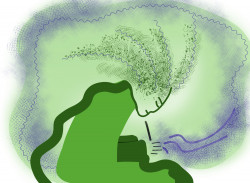
September 23, 2010
Expat Roundup
Two Japan-based authors give chalk'n'cheese takes on the country
By Metropolis
Originally published on metropolis.co.jp on September 2010

At the Sharpe End
by Hugh Ashton
J-Views, 2010, 406pp, ¥1,500

Little Pieces: This Side of Japan
by Michael Hoffman
VBW Publishing, 2010, 206pp, $12.99
Kenneth Sharpe is a rubbish action hero. In the course of At the Sharpe End, Hugh Ashton’s fish-out-of-water thriller, he wets himself when threatened with a gun, throws up at the sight of a corpse, and only really comes into his element when required to turn out a software manual on a tight deadline.
They say that authors should draw on what they know, and Ashton—a British technical writer who’s lived in Japan for yonks—seems to have taken that to heart. His protagonist, a British technical writer who’s lived in Japan for yonks, finds himself caught up in a potentially gnarly diplomatic incident after he’s passed a mysterious package by a Japanese software genius who promptly takes a dive off the platform at Shinjuku station.
Sharpe’s subsequent adventures lead him to Vietnam, South Korea and Shonan, via tussles with gangsters, police and embassy officials, and a brief spell of high-stakes trading on the currency markets. It’s a narrative that could quite easily have tilted into implausibility, but Ashton keeps it grounded by making the main players so frightfully ordinary. Not perfect, but it kept me entertained.
If Ashton is, by his own admission, content to churn out decent airport thrillers, Hokkaido-based scribe Michael Hoffman nurtures more literary ambitions. His latest collection of short stories, Little Pieces, is a selection of diligently crafted miniatures that wrestle with themes of mortality, memory and religion. Christianity and delirium both feature heavily, though generally not at the same time.
In the longest story, “Dragonflies,” a pair of old childhood friends contemplate existence as they slip deeper into middle-aged obscurity; another self-professed mediocrity has a chance reunion with his former babysitter in “First Snow.” The elderly narrator of “The Concussion,” the most structurally ambitious tale here, pieces together fragments of a life that seems to have included some terrible things. It’s dark, tantalizing and demands re-reading.
Others don’t. These are tales of seemingly mundane lives where melodrama forever lurks beneath the surface, and Hoffman is at his best when he keeps the histrionics in check. “The Miracle” collapses with a denouement that’s too sudden and out of character to convince, while the title story, overripe and crowded with competing narrative voices, never really gets off the ground.







